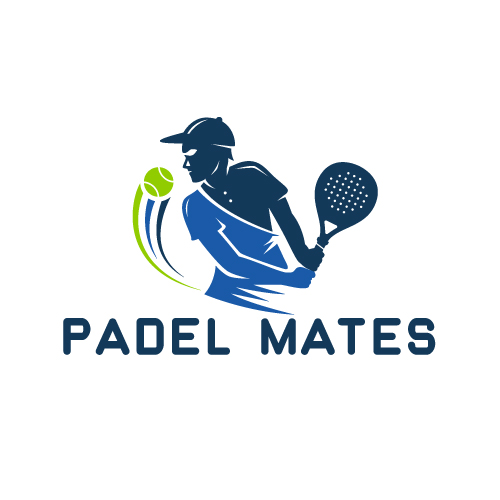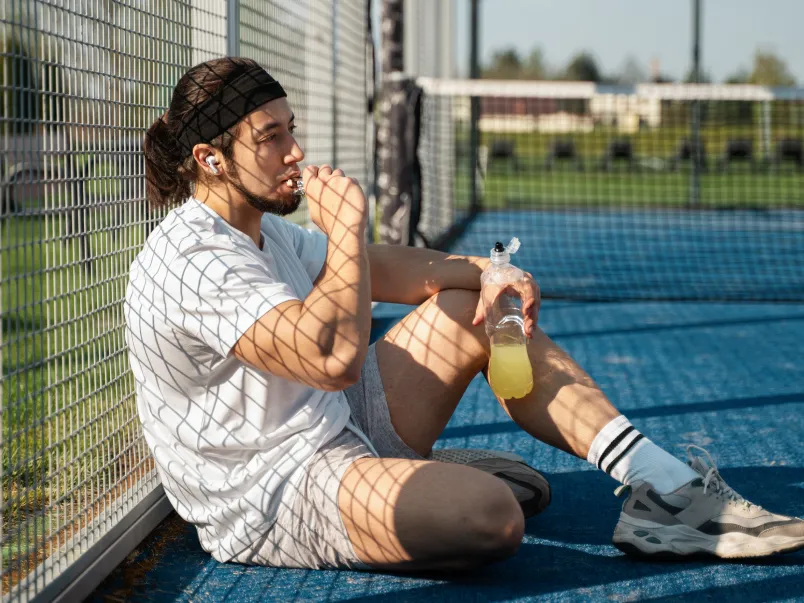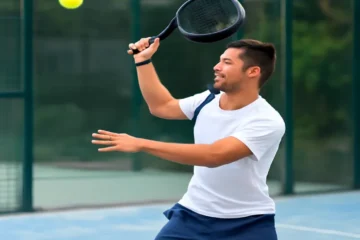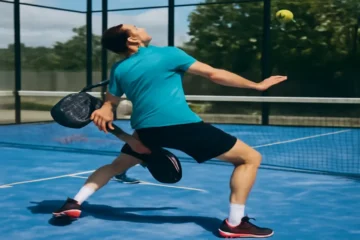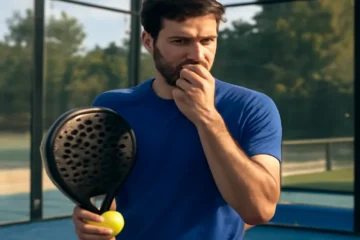Why Hydration is Your Secret Weapon in Padel
Imagine this: you’re in the third set of a fiercely contested padel match. You start to feel sluggish, your focus begins to wane, and you miss a shot you normally wouldn’t. A slight headache creeps in, and your muscles start to feel tight. You wonder, “What went wrong?” The answer might be simpler than you think — hydration.
The Padel Demand
Padel is uniquely demanding. The sport requires explosive, high-intensity bursts of energy, quick lateral movements, and often takes place in warm, sunny climates. All these factors significantly contribute to the body’s fluid loss, especially through sweat. But hydration isn’t just about drinking when you’re thirsty. It’s a key element of optimizing performance, and when done right, it can make all the difference.
Thesis Statement
Proper hydration is not just about quenching thirst; it’s a critical performance enhancer that affects your power, precision, reaction time, and injury prevention. In this article, we’ll break down a practical, science-backed hydration strategy you can implement before, during, and after your matches to ensure peak performance and prevent dehydration.
Part 1: The Science of Sweat – Why You Lose More Than Just Water
Sweat Rate & Electrolytes
Sweat is the body’s natural cooling system. But what many athletes overlook is that sweat contains more than just water — it also contains vital electrolytes such as sodium, potassium, calcium, and magnesium. These electrolytes play crucial roles in maintaining fluid balance, nerve function, and muscle contractions.
Consequences of Dehydration (Even Mild)
Dehydration can quickly lead to a range of negative physical and mental effects.
- Physical Effects:
- Decreased blood volume, meaning your heart has to work harder to pump blood.
- Increased heart rate and a reduced ability to regulate body temperature.
- Reduced endurance, which will affect your overall stamina on the court.
- Muscle cramps and weakness.
- Mental Effects:
- Impaired decision-making and slower reaction times.
- Poor concentration, leading to missed opportunities and unnecessary mistakes.
The Goal
The primary objective in padel is to prevent dehydration before it starts. By the time you feel thirsty, your performance has already begun to suffer. Staying ahead of dehydration is essential for maintaining both physical and mental performance.
Part 2: The Hydration Game Plan – A Timeline for Peak Performance
Phase 1: Pre-Match Preparation (The 24-Hour Foundation)
Hydration begins well before you step onto the court. Preparing your body to perform at its best involves planning your fluid intake throughout the day before your match.
- The Day Before:
Hydration should be consistent throughout the day. Make sure to drink water regularly, aiming for about 2-3 liters (68-102 oz) depending on your body weight and activity level. - The Morning Of:
Aim to drink 500-600 ml (17-20 oz) of water 2-3 hours before your match. This ensures your body is well-hydrated but not overhydrated. - The Hour Before:
Sip on an additional 250-300 ml (8-10 oz) of water or a light electrolyte drink an hour before you play. This will help top off your hydration levels.
Goal
By following these steps, you’ll enter the match fully hydrated and ready for action.
Phase 2: In-Game Hydration (Maintaining the Balance)
Now that you’re on the court, it’s crucial to keep your fluid levels in check as you play. Remember, a consistent hydration routine during the game is key to avoiding fatigue and maintaining your focus.
The Golden Rule: Drink Early and Often
Hydration should not be an afterthought. Don’t wait until you’re thirsty — drink early and often during every changeover.
What to Drink
- For matches under 60-75 minutes: Cool water is usually sufficient.
- For longer sessions or intense heat: A sports drink or electrolyte solution is essential to replace the sodium lost in sweat and provide a quick carbohydrate energy boost.
Practical Strategy
- Small, Frequent Sips: Take small sips throughout the match, aiming for about 150-250 ml (5-9 oz) of fluid every 15-20 minutes.
- Keep Your Bottle Nearby: Always keep your bottle within reach at the back of the court to ensure easy access between points.
Pro Tip: Avoid chugging large amounts of water all at once, as it can lead to bloating and discomfort during play.
Phase 3: Post-Match Recovery (The Replenishment Phase)
Once your match is over, it’s time to focus on recovery. Rehydrating after a match is essential to replenish what was lost during play and to help the body repair itself.
The 1.5x Rule
Weigh yourself before and after the match. For every kilogram (2.2 lbs) you lose during the match, aim to drink 1.5 liters of fluid to restore the loss.
What to Drink
- Water is essential for replenishing fluids.
- Electrolyte Recovery Drinks help replace lost sodium, potassium, and magnesium.
- Chocolate Milk: A surprisingly effective recovery drink due to its balance of carbohydrates, protein, and electrolytes.
The Role of Food
Pair your rehydration efforts with a balanced post-match meal that contains sodium and carbohydrates. Foods like sandwiches, pasta, or fruit can help your body retain the fluids you consume and start the recovery process.
Part 3: Choosing Your Drinks – Water, Electrolytes, and Beyond
Water:
Water is your go-to beverage for staying hydrated, especially during short matches. It’s the foundation of hydration and should be your primary source of fluid throughout the day.
Electrolyte/Sports Drinks:
For longer matches or hot conditions, sports drinks or electrolyte solutions are necessary to replace lost sodium and maintain fluid balance. Look for drinks that contain sodium, potassium, and a small amount of carbohydrates. Avoid those with high sugar content, as they can cause energy spikes and crashes.
Coconut Water:
A natural alternative, coconut water contains electrolytes but often has lower sodium than commercial sports drinks. It can be a good option for light hydration, but if you sweat heavily, it may not provide enough sodium to fully replenish what you’ve lost.
What to Avoid
- Alcohol: Avoid post-match alcoholic beverages as alcohol is a diuretic that promotes fluid loss.
- Excessive Caffeine: While caffeine may seem energizing, it can have a diuretic effect, causing you to lose more fluid. Limit coffee or energy drinks before or after the match.
Part 4: Practical Tips & Tricks for the Padel Player
Invest in a Good Water Bottle
Consider a bottle with time markers to remind you to drink at regular intervals. Keeping your hydration goals visible can help you stay on track.
Monitor Your Urine
Your urine color is a great indicator of your hydration status. A light lemonade color means you’re well-hydrated, while dark yellow suggests it’s time to drink more.
Personalize Your Plan
Everyone’s sweat rate is different. Weigh yourself before and after your matches to understand your personal fluid needs. Use this data to develop a hydration strategy that works best for your body.
Hydrate with Food
Incorporate water-rich foods into your diet, such as cucumbers, watermelon, and oranges. These foods can contribute to your overall hydration without requiring you to drink more fluids.
Conclusion: Make Hydration a Habit
Hydration is an ongoing process, not something you think about just before or during your match. A smart hydration strategy is simple yet incredibly effective, giving you the edge you need to perform at your best. It can help you recover faster, avoid fatigue, and enjoy the game more.
Final Call to Action
Next time you step onto the padel court, make sure your strongest weapon isn’t just your bandeja or víbora, but your water bottle. Stay hydrated, stay focused, and dominate your game.
FAQs: Hydration for Padel Performance
1. How much water should I drink before a padel match?
It’s recommended to drink 500-600 ml (17-20 oz) of water 2-3 hours before your match and another 250-300 ml (8-10 oz) an hour before the game. This ensures you start the match optimally hydrated.
2. What’s the best drink during a padel match?
For matches under 60-75 minutes, cool water is usually sufficient. For longer sessions or during hot conditions, consider a sports drink or electrolyte solution to replenish lost sodium and provide quick energy from carbohydrates.
3. How often should I drink water during the match?
Drink small, frequent sips during every changeover, aiming for about 150-250 ml (5-9 oz) every 15-20 minutes. Don’t wait until you’re thirsty, as your performance may already be affected by then.
4. What should I drink after a match to recover?
After a match, focus on rehydrating with water, an electrolyte drink, or chocolate milk. A balanced post-match meal with sodium (like a sandwich or pasta) can help your body retain fluids and aid recovery.
5. How can I tell if I’m properly hydrated?
Monitor the color of your urine. A light lemonade color indicates you’re well-hydrated, while dark yellow suggests you need more fluids. Also, regular hydration throughout the day will help keep you at optimal levels.
6. Should I avoid any drinks before or after a match?
Yes, avoid alcohol and excessive caffeine. Both act as diuretics, promoting fluid loss. Alcohol, in particular, should be avoided after a match until you’ve fully rehydrated.
7. How can I personalize my hydration plan?
Everyone’s hydration needs are different. To personalize your plan, weigh yourself before and after your matches to understand your unique sweat rate and fluid loss. Use this information to adjust your hydration strategy.
8. Can I hydrate with food?
Yes! Including water-rich foods like cucumbers, watermelon, and oranges in your diet can contribute to your overall hydration and provide extra nutrients to aid performance and recovery.
9. How do electrolytes affect my performance?
Electrolytes like sodium, potassium, and magnesium are essential for fluid balance, muscle function, and nerve conduction. Losing these electrolytes through sweat without replenishment can lead to muscle cramps, fatigue, and impaired performance.
10. How can I stay hydrated during longer padel matches or in hot conditions?
For long matches or hot weather, make sure to consume an electrolyte drink to replace the lost sodium and maintain your energy levels. Sip regularly, starting early in the match, and aim for 150-250 ml every 15-20 minutes.
11. What’s the “1.5x Rule” for post-match hydration?
To recover from fluid loss, weigh yourself before and after your match. For every kilogram (2.2 lbs) lost during the match, aim to drink 1.5 liters of fluid to properly rehydrate and restore lost electrolytes.
